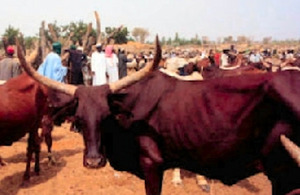DFID Research: Protecting African cattle from killer disease
A vaccine against East coast fever is being mass-produced to protect cattle and the livelihoods of African farmers

African cattle
A much-needed vaccine that protects cattle against a deadly parasite is being mass-produced in a drive to protect the livelihoods of millions of African families.
East coast fever (also known as theileriosis) is a tick-transmitted disease that kills 1 cow every 30 seconds - with 1 million a year dying of the disease.
East coast fever mainly occurs in Eastern and Southern Africa. In herds kept by the pastoralist Maasai, for example, the disease kills from 20 to over 50% of unvaccinated calves. This makes it difficult and often impossible for the herders to plan for the future, to improve their livestock enterprises and raise their standard of living.
A vaccine against East Coast fever was first developed with DFID (ODA) support more than 30 years ago but remained experimental as better options were investigated. In the intervening period field use of the vaccine has proved it to be highly effective.
As stocks run low, more than 25 million cattle are at risk in the 11 countries where the disease is endemic. A further 10 million animals are at risk in new regions such as southern Sudan, where the disease has been spreading more than 30 kilometres a year.
To ensure protection, The Global Alliance for Livestock Vaccines and Medicines (GALVmed), a public private partnership, supported by DFID and the Bill & Melinda Gates Foundation has facilitated the production of a million vaccine doses with plans for commercial production to meet future needs. Galvmed has managed to get the product registered for use and attracted commercial distributors. This will ensure that the vaccine is made available, accessible and affordable to livestock keepers who need it most and to scale up its future production. The vaccine could save the 11 affected countries at least £175 million a year.
What this means on the ground is summed up by Ngayok Legilisho, a farmer from Ngoswak village, Longido District, Tanzania.
“Before it was a struggle to feed the family. With the vaccines, we can sell one or two healthy cows and be able to educate our children and enjoy other activities. We are also able to build permanent homes.”
More about GALVmed
GALVmed was established with the support of DFID research in 2005. Its purpose is to make animal health products available to poor livestock keepers in low income countries that are affordable and technically suitable. GALVmed works with business, international agencies and public research organisations. The organisation aims to bring vaccines against 7 livestock diseases that particularly affect the poor farmers to the market by 2015 and, by working with the NGO Farm Africa, ensure that veterinary services able to function in remote and underserved areas are in place by then.